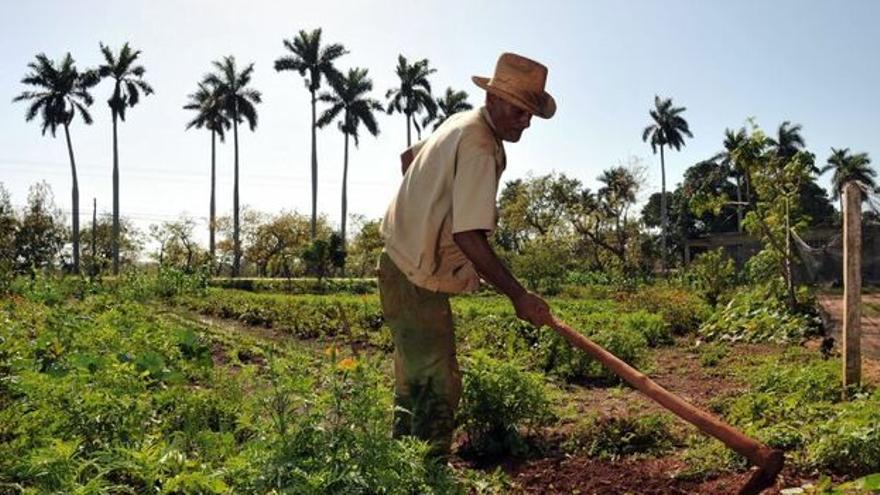
![]() 14ymedio, Havana/Miami, 6 October 2020 — Private agricultural producers in Cuba can now legally employ workers who are not licensed as self-employed. This measure formalizes the old practice of hiring day laborers in the fields ‘under the table’ and does not solve the serious problems faced by farmers, according to testimonies collected by 14ymedio.
14ymedio, Havana/Miami, 6 October 2020 — Private agricultural producers in Cuba can now legally employ workers who are not licensed as self-employed. This measure formalizes the old practice of hiring day laborers in the fields ‘under the table’ and does not solve the serious problems faced by farmers, according to testimonies collected by 14ymedio.
This type of contracting will be possible “at the peak of harvest, planting, and cultivating work or other activities of a similar nature,” according to a resolution from the Ministry of Labor and Social Security published on September 23 in the Official Gazette.
The measure seeks to “strengthen and improve agricultural production” at a time when the country urgently needs to strengthen agriculture and put more food in the markets.
“The new measure is correct, but insufficient,” Esteban Ajete, president of the League of Independent Farmers, told 14ymedio. The hiring of temporary labor in times of harvest, he says, has always been a reality and the requirement that day laborers be licensed to work in agriculture as self-employed individuals has almost never been met.
“Now, what was already a reality in the Cuban fields is being accepted as legal.” The activist insists that informal work has been a constant for decades due to the complexity of the previous hiring mechanisms. That, together with the inability of the State to deploy a body of inspectors to review compliance with the above requirements, made the regulations less than useless.
However, the current flexibility has left a bitter taste in the face of the farmers’ impatience to see the solution to other more decisive requirements for agricultural production.
“With this resolution, the contracted workers will no longer be forced to get self-employment licenses or pay personal income taxes and the farmers who hire them will not have to pay these costs either. It is not what we want, but it is something,” says Ajete, who recalls that the abolition of taxes on food producers and processors for ten years is one of the demands of the Without The Countryside There Is No Country campaign, which was initiated this April by the League of Independent Farmers and the Cuban chapter of the Latin American Federation of Rural Women (Flamur).
Among the requests was also that of granting freedom for the production and distribution of products, to set prices according to the market, to import and export directly, and the delivery of permanent property titles to all agricultural producers.
In recent months, Cuba’s national authorities have repeatedly called for increased agricultural production. With the pandemic, the shortage of fruits, vegetables and grains has worsened in a country that imports about 80% of its food needs annually.
The deficient state management of the fields has brought losses of crops that rot without transport to take them to the markets, as well as poor services for the sales of seeds and other inputs to the farmers. From the lack of adequate clothing to work in the fields to the impossibility of buying a tractor, the guajiros lament the neglect of the sector and the few resources they have.
Now, the new resolution indicates that “the employment contract can be concluded verbally for a period that does not exceed ninety days” and establishes that the agricultural producer must guarantee minimum working conditions, including an eight-hour working day, the remuneration cannot be lower than the minimum wage approved in the country in proportion to the actual working time, and the conditions of safety and health at work must be maintained.
But the measure has not been received in the same way by everyone. “Now that agricultural worker, who was already the most fragile link on Cuban farms because he does not have his own land and does the hardest work, will also be more unprotected,” economist Nara Manduley explains to 14ymedio. In her opinion, the farmer who hires a day laborer will be able to evade his salary obligations, as has happened until now.
“What is being done legalizes the job insecurity of a group of people who are vital for food production,” Manduley says. “That is not the way to increase production or to unlock the productive forces,” she adds.
Alfredo Pérez, a tobacco farmer from the La Isleña farm in San Juan y Martínez (Pinar del Río), believes that this measure “legalizes the blind eye they’ve had here going back a long time [because] they never applied the laws they established or imposed fines on those who hired workers without papers, so now everyone can work however they want.”
A farmer from San Antonio de los Baños, who preferred not to be identified, referred to the new regulation saying: “Doing it little by little, this way is not going to lead the the advances they need. They can’t be so timid. They know they have to open it up so they should do it all at once.”
______________
COLLABORATE WITH OUR WORK: The 14ymedio team is committed to practicing serious journalism that reflects Cuba’s reality in all its depth. Thank you for joining us on this long journey. We invite you to continue supporting us by becoming a member of 14ymedio now. Together we can continue transforming journalism in Cuba.
